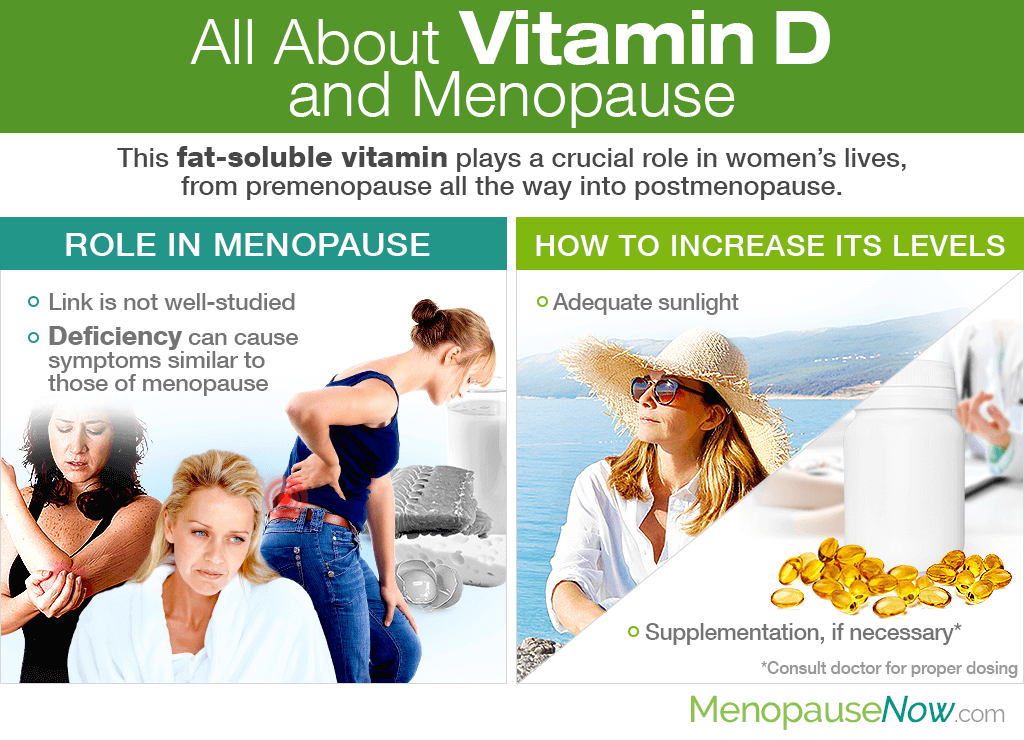While vitamin D is famous for its involvement with maintaining healthy bones, there is much more to this vitamin than what meets the eye, especially for women who are exiting their reproductive years. Continue reading all about vitamin D and menopause, including the role of vitamin D in menopause, how to increase its levels throughout the transition, and much more.
About Vitamin D
Vitamin D is a fat-soluble vitamin that is necessary for healthy calcium absorption, bone mineralization, and bone growth and remodeling.
Calcium and vitamin D together protect older adults from osteoporosis as insufficient vitamin D levels can disrupt calcium absorption and cause bones to become brittle and thin.
It can be obtained from sunlight, foods, or supplements. Foods with vitamin D include the flesh of fatty fish, like salmon, tuna, or mackerel; beef liver; cheese; and egg yolks. However, fortified foods provide more of the vitamin, and they include milk or orange juice.
Role of Vitamin D in Menopause

The role of vitamin D in menopause is not well-studied. What is known concerns the vitamin's role in general health throughout all stages of life, from pre- into postmenopause.
As such, it is known that symptoms of vitamin D deficiency no matter one's age include:
- Proximal muscle weakness
- Bone discomfort or pain
- Muscle aches
- Symmetric low back pain
- Depression
- Decreased cognitive function
- Among others
It is not uncommon for a deficiency in vitamin D in menopause to be misdiagnosed as chronic fatigue syndrome, fibromyalgia, or arthritis.
Furthermore, one study concluded that there is no statistically significant association between the levels of vitamin D and menopause symptoms.1 Yet, as can be seen, its deficiency can cause symptoms similar to those experienced as women are transitioning out of their reproductive years.
Keep in mind that a vitamin D deficiency can also inhibit calcium absorption as vitamin D is required to absorb calcium from the gut into the bloodstream. The symptoms of calcium deficiency can mirror those of menopause, including muscle aches and tingling extremities.
How to Increase Vitamin D in Menopause and Beyond

The body makes vitamin D from sunlight through a couple different steps. When the sun's energy hits the skin, a chemical is converted to vitamin D3. This vitamin D3 is then transferred to the liver and kidneys, where it is turned into active vitamin D.2
As such, the best way to prevent a vitamin D deficiency, relieve symptoms, and decrease the risk of future fractures is to receive adequate sun exposure. Ninety percent of vitamin D is typically obtained from sunlight.3
The exact amount of time needed in the sun is not clear. While five to 15 minutes two to three times a week may be enough for many, those over the age of 65, with darker skin, or living in northern climates may need more time. Other factors that also interfere include the use of sunscreen and standing behind a window.4
As such, for those with insufficient sunlight exposure, supplementation of 700 to 800 IU every day has been found to reduce fractures in older adults.3
It is important to speak with your doctor about how to combine proper diet with vitamins in order to reach your health goals, especially if you are postmenopausal since the skin's ability to make vitamin D lessens with age.
Without a doubt, increasing levels of vitamin D in menopause before having a deficiency is easier than fixing more serious degradation of the bones from depriving them of the vitamins and minerals they need to be healthy.
Further Recommendations
Vitamin D is not the only vitamin necessary for optimal well-being throughout the years. There are various other vitamins and minerals for menopause that women should look into if they want these transformative years to pass by in good health.
Also, aging women should look into relieving hormonal imbalance symptoms sooner rather than later. Natural and effective menopause symptoms treatments that focus primarily on promoting endocrine system health will help them reach their optimal state of health in a timely manner.
Sources
- Kennel, K.A. et al. (2010). Vitamin D Deficiency in Adults: When to Test and How to Treat. Mayo Clinic Proceedings, 85(8), 752-758. doi: 10.4065/mcp.2010.0138
- National Institutes of Health. (2019). Vitamin D. Retrieved September 10, 2019, from https://ods.od.nih.gov/factsheets/VitaminD-HealthProfessional/
- Lips, P. & van Schoor, N.M. (2011). The effect of vitamin D on bone and osteoporosis. Best Practice & Research: Clinical Endocrinology & Metabolism, 25(4), 585-591. doi: 10.1016/j.beem.2011.05.002.
- Society for Endocrinology. (2018). Hypocalcaemia. Retrieved September 11, 2019, from https://www.yourhormones.info/endocrine-conditions/hypocalcaemia/
Footnotes
- LeBlanc, E.S. et al. (2014). Vitamin D levels and menopause-related symptoms. Menopause, 21(11), 1197-1203. doi: 10.1097/GME.0000000000000238
- Harvard Health Publishing. (2019). Vitamin D and your health: Breaking old rules, raising new hopes. Retrieved September 11, 2019, from https://www.health.harvard.edu/staying-healthy/vitamin-d-and-your-health-breaking-old-rules-raising-new-hopes
- Bordelon, P. et al. (2009). Recognition and Management of Vitamin D Deficiency. American Family Physician, 80(8), 841-846. Retrieved September 10, 2019, from https://www.aafp.org/afp/2009/1015/p841.html
- Cleveland Clinic. (2015). Vitamin D & Vitamin D Deficiency. Retrieved September 10, 2019, from https://my.clevelandclinic.org/health/articles/15050-vitamin-d--vitamin-d-deficiency

